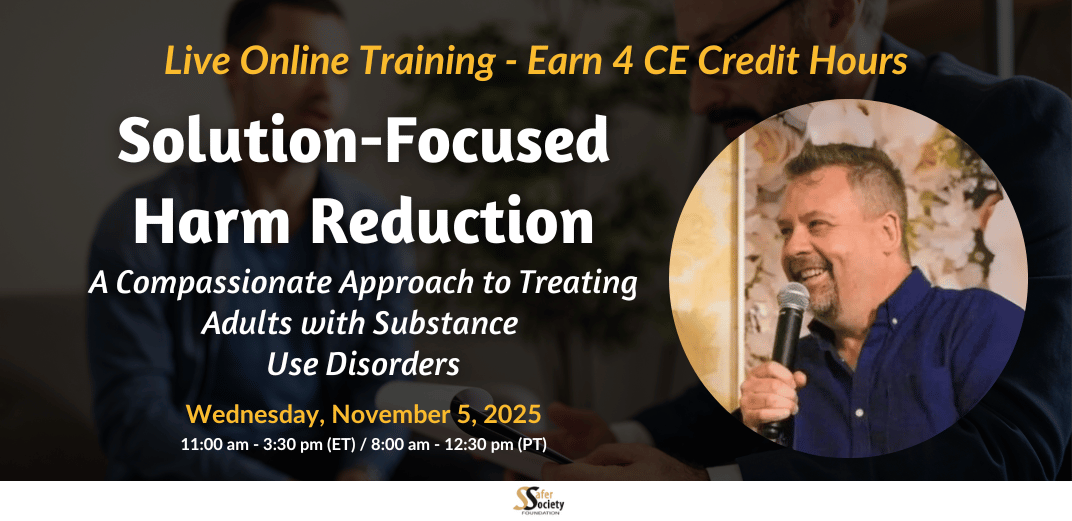
Solution-Focused Harm Reduction: A Compassionate Approach to Treating Adults with Substance Use Disorders
Solution-Focused Therapy (SFT) offers a practical framework for supporting clients, including those navigating substance use concerns. By emphasizing clients’ strengths, preferred futures, and concrete goals—rather than dwelling exclusively on problems—SFT has been widely valued for its efficiency and collaborative spirit.
 Similarly, harm reduction approaches recognize that focusing solely on abstinence tends to limit engagement and overlooks the diverse realities of people’s lives. Instead, harm reduction approaches work to reduce risk and improve wellbeing by:
Similarly, harm reduction approaches recognize that focusing solely on abstinence tends to limit engagement and overlooks the diverse realities of people’s lives. Instead, harm reduction approaches work to reduce risk and improve wellbeing by:
- addressing the wider context of harmful behavior,
- decreasing the stigma associated with various conditions, such as addiction,
- increasing education on safer substance use and violence prevention,
- supporting informed choices such as protected sex, and
- fostering access to health and social services or support groups.
Solution-Focused Harm Reduction (SFHR) brings the two approaches together. By blending harm reduction’s pragmatic and nonjudgemental stance with SFT’s strengths-based, goal-orientated methods, SFHR offers a compassionate approach to supporting people with problematic behaviors, such as substance use disorders.
Dr. Séan Foy developed this training to introduce participants to SFHR as a practical approach to working with people who use substances or display other high-risk behaviors. He explains the many synergies between solution-focused therapy and harm reduction, and describes how the two approaches are complementary and, when used in conjunction, create a novel way of approaching addiction work.
During the training, Dr. Foy demonstrates how to build respectful, collaborative relationships that focus on what’s working, what’s possible, and what clients want for themselves—regardless of whether abstinence is the goal. Through case examples, group discussion, and hands-on exercises, this workshop provides helping professionals with the tools to engage meaningfully with clients, even those mired in complex or chaotic situations.
Interactive Follow-Up Meeting
Attendees are invited to join an open discussion 15 minutes following the end of the training, where you can engage with fellow attendees by turning on your camera and microphone. This is an opportunity to share your experiences and contribute to a meaningful exchange of ideas. Time will be allocated to address questions or insights from the training. Please note that attendance is optional and will not affect your eligibility for a training certificate.
1) Define the key principles of Solution-Focused Harm Reduction and how they contrast with the principles of traditional models of substance use treatment.
2) Summarize the role of language, listening, and curiosity in building respectful, change-oriented conversations with clients.
3) Apply solution-focused techniques such as scaling questions, exception finding, and goal setting within a harm reduction context.
4) Identify ways to support client autonomy while maintaining safety, boundaries, and realistic service expectations.
5) Give examples of common challenges (e.g., ambivalence, risk, systemic barriers) and generate collaborative, client-led strategies for moving forward.
Audience
This training is for professionals working with people who have faced challenges due to substance abuse and/or whose actions have harmed others. This includes social workers, psychologists, clinical counselors, and interested paraprofessionals.
Content Level
Disclosure
Cancellations
Continuing Education Approval
American Psychological Association (APA)
Safer Society Foundation, Inc. is approved by the American Psychological Association (APA) to sponsor continuing education for psychologists. Safer Society Foundation, Inc. maintains responsibility for this program and its content.
Association of Social Work Boards (ASWB)
Safer Society Foundation, Inc., provider #233, is approved to offer social work continuing education by the Association of Social Work Boards (ASWB) Approved Continuing Education (ACE) program. Regulatory boards are the final authority on courses accepted for continuing education credit. ACE provider approval period: 06/06/2025—06/06/2026. Social workers completing this course receive 4 clinical continuing education credits.
Who's Presenting

Séan Foy, D.Clin Psych, M.A, B.Sc, Dip.,Reg Psychol PsSi,ACI, IACP
Dr. Foy is the Founder and Managing Director of The Learning Curve Institute and is a Clinical Psychologist who has worked in the caring profession for over 30 years. Throughout his career Seán has worked in a variety of settings, mainly with people who may be experiencing addiction and/or mental health challenges. Seán holds a Doctorate in Clinical Psychology (NUI, Galway), a Masters in Addiction Studies (Middlesex University), an Honours degree in Social Work (Metropolitan University, London) and an Honours degree in Counselling and Psychotherapy (Middlesex University), a Diploma in Drug Dependence (The Maudsley Hospital London), and a Higher Diploma in Education (Bristol University of the West of England). Dr. Foy is also a lecturer in Psychology and Mental Health studies in The Atlantic Technological University (ATU) and an adjunct lecturer at NUI Galway on the Masters in Social Work and the Clinical Doctorate in Psychology.
Seán works from an evidence-based approach and strongly believes in working in a way that is considered, compassionate, and creates a meaningful relationship with people. He has delivered presentations to a variety of international conferences and continues to be involved in research. Most recently he presented at the UKASFP Conference Oxford 2023 on the topic of his book ‘Solution Focused Harm Reduction’ which is available on Amazon. The presentation explained the many synergies between solution focused brief therapy and harm reduction and how these two approaches are complementary and when used in conjunction, create a novel way of approaching addiction work. Seán was honoured to present at the Citizens Assembly on Drug Use (June 2023) on the Bio-Psycho-Social model and participated on the panel of experts in relation to treatment.
